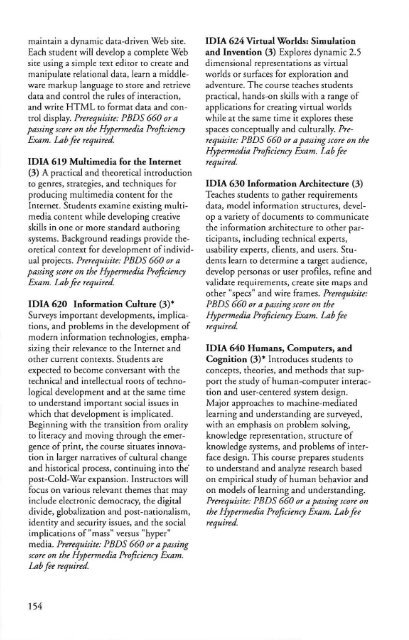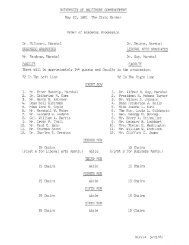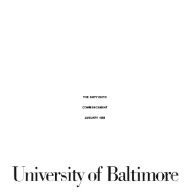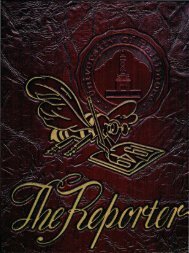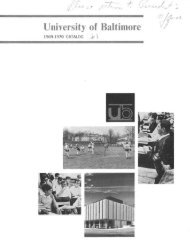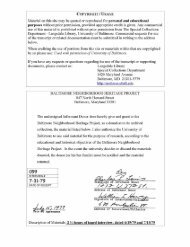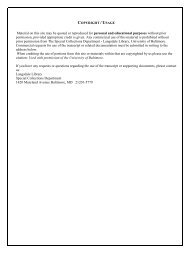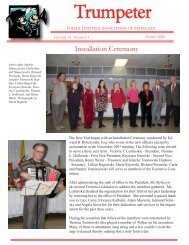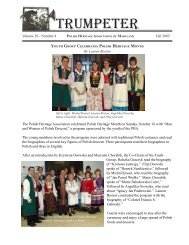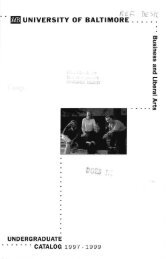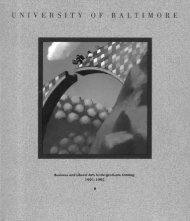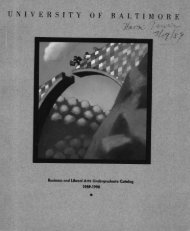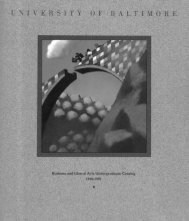2003-2005 - Special Collections - University of Baltimore
2003-2005 - Special Collections - University of Baltimore
2003-2005 - Special Collections - University of Baltimore
You also want an ePaper? Increase the reach of your titles
YUMPU automatically turns print PDFs into web optimized ePapers that Google loves.
maintain a dynamic data-driven Web site.<br />
Each student will develop a complete Web<br />
site using a simple text editor to create and<br />
manipulate relational data, learn a middleware<br />
markup language to store and retrieve<br />
data and control the rules <strong>of</strong> interaction,<br />
and write HTML to format data and control<br />
display. Prerequisite: PBDS 660 or a<br />
passing score on the Hypermedia Pr<strong>of</strong>iciency<br />
Exam. Lab fee required.<br />
lOlA 619 Multimedia for the Internet<br />
(3) A practical and theoretical introduction<br />
to genres, strategies, and techniques for<br />
producing multimedia content for the<br />
Internet. Students examine existing multimedia<br />
content while developing creative<br />
skills in one or more standard authoring<br />
systems. Background readings provide theoretical<br />
context for development <strong>of</strong> individual<br />
projects. Prerequisite: PBDS 660 or a<br />
passing score on the Hypermedia Pr<strong>of</strong>iciency<br />
Exam. Lab fee required.<br />
lOlA 620 Information Culture (3)*<br />
Surveys important developments, implications,<br />
and problems in the development <strong>of</strong><br />
modern information technologies, emphasizing<br />
their relevance to the Internet and<br />
other current contexts. Students are<br />
expected to become conversant with the<br />
technical and intellectual roots <strong>of</strong> technological<br />
development and at the same time<br />
to understand important social issues in<br />
which that development is implicated.<br />
Beginning with the transition from orality<br />
to literacy and moving through the emergence<br />
<strong>of</strong> print, the course situates innovation<br />
in larger narratives <strong>of</strong> cultural change<br />
and historical process, continuing into the'<br />
post-Cold-War expansion. Instructors will<br />
focus on various relevant themes that may<br />
include electronic democracy, the digital<br />
divide, globalization and post-nationalism,<br />
identity and security issues, and the social<br />
implications <strong>of</strong> "mass" versus "hyper"<br />
media. Prerequisite: PBDS 660 or a passing<br />
score on the Hypermedia Pr<strong>of</strong>iciency Exam.<br />
Lab fee required.<br />
154<br />
lOlA 624 Virtual Worlds: Simulation<br />
and Invention (3) Explores dynamic 2.5<br />
dimensional representations as virtual<br />
worlds or surfaces for exploration and<br />
adventure. The course teaches students<br />
practical, hands-on skills with a range <strong>of</strong><br />
applications for creating virtual worlds<br />
while at the same time it explores these<br />
spaces conceptually and culturally. Prerequisite:<br />
PBDS 660 or a passing score on the<br />
Hypermedia Pr<strong>of</strong>iciency Exam. Lab fee<br />
required.<br />
lOlA 630 Information Architecture (3)<br />
Teaches students to gather requirements<br />
data, model information structures, develop<br />
a variety <strong>of</strong> documents to communicate<br />
the information architecture to other participants,<br />
including technical expertS,<br />
usability experts, clients, and users. Students<br />
learn to determine a target audience,<br />
develop personas or user pr<strong>of</strong>iles, refine and<br />
validate requirements, create site maps and<br />
other "specs" and wire frames. Prerequisite:<br />
PBDS 660 or a passing score on the<br />
Hypermedia Pr<strong>of</strong>iciency Exam. Lab fee<br />
required.<br />
lOlA 640 Humans, Computers, and<br />
Cognition (3)* Introduces students to<br />
concepts, theories, and methods that su pport<br />
the study <strong>of</strong> human-computer interaction<br />
and user-centered system design.<br />
Major approaches to machine-mediated<br />
learning and understanding are surveyed,<br />
with an emphasis on problem solving,<br />
knowledge representation, structure <strong>of</strong><br />
knowledge systems, and problems <strong>of</strong> interface<br />
design. This course prepares students<br />
to understand and analyze research based<br />
on empirical study <strong>of</strong> human behavior and<br />
on models <strong>of</strong>learning and understanding.<br />
Prerequisite: PBDS 660 or a passing score on<br />
the Hypermedia Pr<strong>of</strong>iciency Exam. Lab fee<br />
required.


